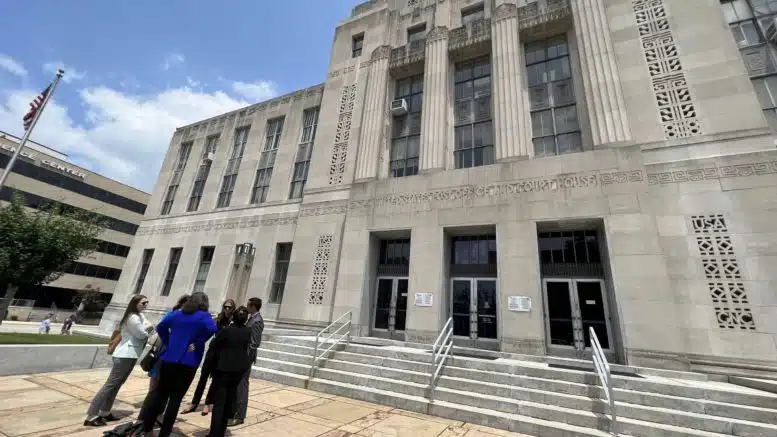By Anne Blythe
A federal court judge has temporarily blocked one portion of North Carolina’s new abortion restriction law one day before it is set to take effect.
The ruling, issued Friday afternoon by Judge Catherine Eagles, an Obama appointee, stops short of curbing the new limits to abortion after 12 weeks of pregnancy — changes passed into law this year by the Republican-led state legislature.
Most of the law and ensuing clarifying amendments, passed this week, take effect on Saturday. Health care providers say they already are having an impact on patients.
The temporary restraining order blocks the immediate implementation of a provision in Senate Bill 20 that requires a “physician prescribing, administering, or dispensing an abortion-inducing drug” to document in the “woman’s medical chart the … existence of an intrauterine pregnancy.”
Sometimes ectopic pregnancies happen and cannot be documented as occurring inside a patient’s uterus, attorneys argued earlier this week to Eagles.
“If the pregnancy is in early stages and the physician cannot document the existence of an intrauterine pregnancy, then the physician cannot comply with this requirement,” Eagles wrote in her ruling.
The law, Eagles continued, is “ambiguous as to whether a provider who cannot comply with the documentation requirement because it is impossible, is prohibited from proceeding with the medical abortion early in pregnancy.”
Eagles added that she would return to that issue later in the legal process.
For the most part, though, Eagles allowed the law that was introduced and adopted in less than 72 hours in the General Assembly in May, to take effect. That means most people seeking medical or surgical abortions after 12 weeks of pregnancy in North Carolina will be denied the procedures.
The judge’s action stems from a lawsuit filed June 16 by Planned Parenthood South Atlantic and Duke Health physician Beverly Gray against Josh Stein, the state attorney general, Kody Kinsley, secretary of the state Department of Health and Human Services, some district attorneys and leaders of the state medical and nursing boards.
A physician’s response
The challengers contend that Senate Bill 20 is too vague, with conflicting requirements, making it unconstitutional and too difficult for health care providers and others to know what is required for certain abortion services.
The new law curbs most abortions after 12 weeks of pregnancy. There are some exceptions that can be made, though, for rape, incest and fetal anomalies considered to be “life-limiting.”
“The court did the right thing in partially blocking this law,” Gray said in a prepared statement issued Friday. “[P]atients seeking care in North Carolina will still be forced to suffer the life-altering impacts of being denied access to essential health care because of an arbitrary ban on abortion after the 12th week of pregnancy. This suffering is inhumane and contradicts my duty to provide people with the necessary care they need.”
The temporary restraining, or TRO, order expires July 14. TROs typically are short-lived. They are usually issued in emergency situations when parties have not had time to present fuller cases to a judge and irreparable harm could result if no action were taken.
A battalion of attorneys
Eagles held a hearing in the Greensboro U.S. Middle District federal courthouse on June 28, drawing a battalion of attorneys.
As the July 1 date for the law to become effective quickly approached, lawyers representing Planned Parenthood, Gray and other health care providers navigating the new landscape for abortion care asked for a wider-ranging temporary restraining order.
In the two and a half hour hearing, Eagles fielded arguments about why she should or should not put temporary restraints on the new abortion restriction law, in full or in part.
Though Eagles said she had made no decision that morning about what she might do, and admonished any media present for reporting anything to the contrary, she indicated that she was not inclined to put a full halt on the law at that point.
“I don’t see any way that I’m going to enjoin Part I in its entirety,” Eagles said, referring to the portion of the new law that makes most abortions illegal after 12 weeks instead of after the previous 20-week threshold.
The requirement forcing sexual assault survivors who obtain abortions after 12 weeks to do so in a hospital instead of a clinic won’t go into effect until Oct. 1, both sides agreed at the hearing. “Therefore, an immediate order is unnecessary,” Eagles stated in her ruling issued Friday afternoon.
That portion of the law still could be blocked later in the legal proceedings as the parties provide more information to the judge.
Abortion advocates say that forcing people to go to a hospital for the procedures will create an extra financial burden, when the procedures could take place in a clinic where the care could be provided at a lower cost.
The attorneys from both sides also agreed after the hearing to stipulate their shared interpretation of another segment of the law. One provision could be read to prohibit health care providers from advising a person on how they can access abortion after 12 weeks in states where such procedures are legal.
Attorneys for Planned Parenthood argued the law, as written, could put some health care providers at risk of facing civil or criminal penalties if they spoke with a patient about that option.
To ensure that no such action happens, the following condition was added: “For the avoidance of doubt, this stipulation means that advising, procuring, causing, or otherwise assisting someone in obtaining a lawful out-of-state abortion is not a criminal offense” under a state law that imposes penalties for the murder of an unborn child.
Given that, Eagles stated in her ruling, there was no need for a temporary restraining order.
Clarifying tweaks
Amendments passed by both General Assembly chambers this week and signed into law by Gov. Roy Cooper on Thursday also did away with the need to add more provisions to the temporary restraining order before attorneys had made fuller arguments on some of the issues of contention.
That clean-up list from the amendments clears up that:
- It is not fetal homicide to perform a lawful abortion under the new law.
- For a medical abortion to be lawful, providers are not required to verify the gestational age is less than 70 days. The law, as written, had stipulated restrictions after 12 weeks in one portion, and restrictions after 70 days — or 10 weeks — in another portion of the law.
- There is an exception for medical emergencies to the mandate requiring the 72-hour wait between the two appointments with a health care provider necessary to obtain an abortion.
- Providers are not required to inform a patient whether insurance will cover an abortion.
- Providers are not required to file complete reports within three days for minors who obtain abortions.
“Starting tomorrow, North Carolinians will no longer be able to access abortion after the 12th week of pregnancy, and they will be forced to endure medically unnecessary restrictions that make it harder to get the health care they need even before 12 weeks,” Jenny Black, president and CEO of Planned Parenthood South Atlantic, said in a statement.
“Our legal challenge forced General Assembly leadership to clean up their mess of a bill, but we never should have had to sue to get clarity on how to comply with this law.”
Cooper vetoed SB 20 in May, but after the General Assembly overrode his veto, he signed the amendments lawmakers adopted this week. The governor stated that while he remains opposed to the new curbs on abortion, the amendments brought some needed clarity to what he still considered a bad bill.
Sign up for our Newsletter
“*” indicates required fields
“In addition to being dangerous for women, the rushed abortion ban was so poorly written that it is causing real uncertainty for doctors and other health care providers,” Cooper said in a statement. “This bill is important to clarify the rules and provide some certainty, however we will continue fighting on all fronts the Republican assault on women’s reproductive freedom.”









